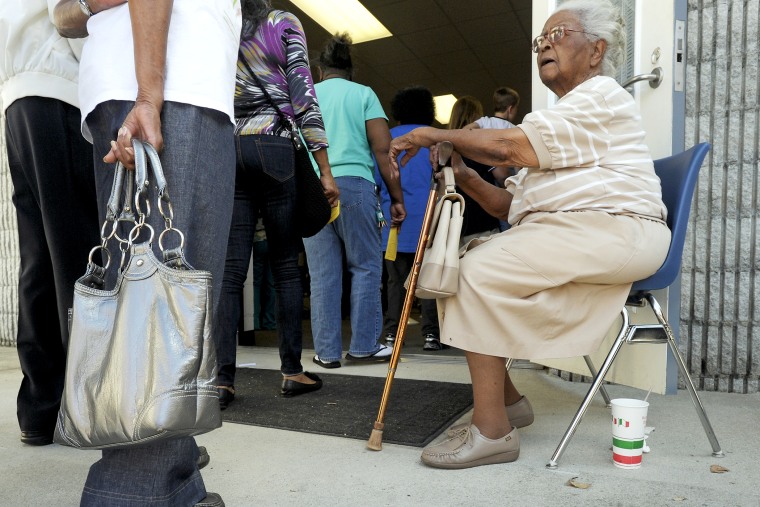North Carolina’s restrictive voting law will not be struck down before voters go to the polls next fall, after a federal judge ruled Thursday that the trial over the measure won't take place until 2015.
The decision could make it harder for blacks and Hispanics to vote in the state next fall. It also highlights how the Supreme Court’s weakening of the Voting Rights Act made it much harder to quickly counter laws that limit access to the ballot.
The ruling increases the chances that the law will be in force for the 2014 elections, though it doesn’t guarantee it. Voting rights advocates already have asked for an injunction blocking some provisions from going into effect before the full case is heard.
Both the Justice Department and civil rights groups are challenging the law. Lawyers for DoJ agreed with the state that the trial should not take place until 2015, citing the need to compile evidence that it disenfranchises voters. The civil rights groups wanted a trial before next fall’s elections.
Not getting one isn’t just an issue of legal procedure, they say.
“It wasn’t just a technical matter,” Penda Hair, a lawyer for the Advancement Project, which is challenging the law on behalf of the North Carolina NAACP, told reporters on a conference call Thursday. “We needed to be heard before the 2014 general election, so we can have an opportunity to have the voters tell their story, to tell how they will be harmed and denied and burdened in their right to vote if this law is allowed to go into effect.”
North Carolina’s law, signed by Gov. Pat McCrory this summer, is the strictest in the country. It would require only certain forms of photo ID, cut early voting, end same-day voter registration, and make it harder for high schoolers to pre-register, among other provisions. The voter ID requirement does not go into effect until 2016.
There’s little question that the law hits minorities especially hard. In court filings, the Justice Department has noted that blacks make up 23% of the state’s registered voters, but 34% of those who don’t have an ID issued by the DMV. Studies show black voters in North Carolina are also more likely than whites to vote early.
Thursday’s ruling highlights the ongoing reverberations of the Supreme Court’s decision in Shelby County v. Holder in June. In that case, the court invalidated Section 5 of the 1965 Voting Rights Act, which had required that certain jurisdictions—including much of North Carolina—get federal sign off before any election changes could go into effect, to ensure they don’t reduce minority political power. It left standing Section 2, which also bars discrimination but requires victims to sue after a new law has gone into effect.
Voting rights advocates argued at the time that, thanks in part to that key difference, Section 2 is less effective than Section 5. They noted that litigation is typically expensive and time-consuming, meaning that even if a challenge is brought, an election might occur before a case resolved. Now that concern may be playing out in North Carolina.
Sen. Kay Hagan, a North Carolina Democrat, is up for re-election next year, and likely faces a tough race. The frontrunner for the GOP nomination, House Speaker Thom Tillis, was a key backer of the voting law. Democrats also are looking to win seats in the state legislature, where the GOP currently holds supermajorities.
